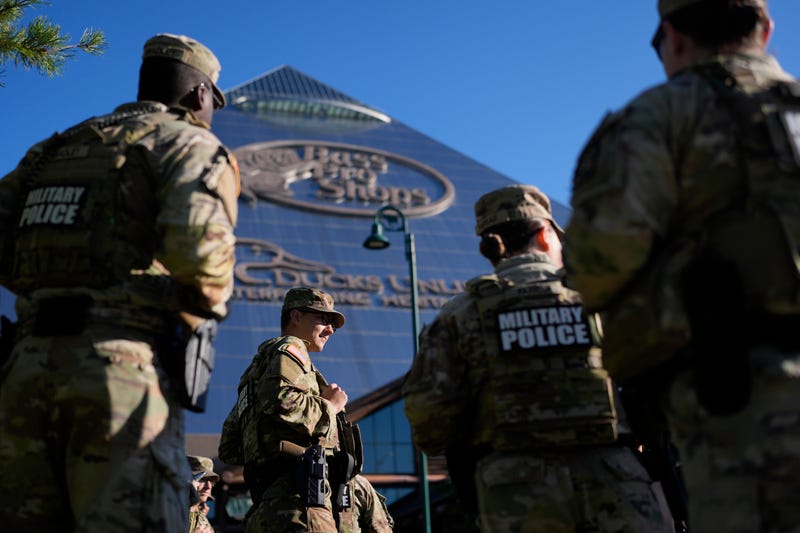
MEMPHIS, Tenn. (AP) — National Guard troops patrolled in Tennessee's second-largest city for the first time Friday while soldiers in Illinois were engaged only in planning and training after a judge handed a loss to the Trump administration and blocked their deployment to the Chicago area.
At least nine armed Guard members began their patrol at the Bass Pro Shops located at the Pyramid, an iconic Memphis landmark, about a mile (1.6 kilometers) from historic Beale Street and FedEx Forum, where the NBA's Grizzlies play.
They also were at a nearby tourist welcome center along the Mississippi River. Wearing Guard fatigues and protective vests labeled “military police,” the troops were escorted by a local police officer and posed for photos with visitors.
Meanwhile, in Illinois, Democratic U.S. Sens. Dick Durbin and Tammy Duckworth said they were barred from visiting an immigration enforcement building near Chicago. For weeks it's been home to occasional clashes between protesters and federal agents.
“What are you afraid of?” Duckworth told reporters, referring to the government. “You don’t hide, you don’t run away when you’re proud of what you’re doing.”
In Memphis, Mayor Paul Young, a Democrat, said he never requested that the Guard come to his city. But after President Donald Trump made the Sept. 15 announcement and Republican Gov. Bill Lee agreed, Young and others said they wanted the task force to focus on targeting violent offenders rather than use their presence to scare, harass or intimidate the general public.
Police Chief Cerelyn “CJ” Davis said she hoped Guard personnel would help direct traffic and have a presence in “retail corridors,” but not be used to operate checkpoints or anything similar.
It was unclear how many Guard members were on the ground Friday or were expected to arrive later. Lee previously said troops would not make arrests and would not be armed unless local law enforcement officials request it.
For years, Memphis, whose population exceeds 600,000, has dealt with high violent crime, including assaults, carjackings and homicides. While this year’s statistics show improvement in several categories, including murders, many acknowledge that violence remains a problem.
Federal officials say hundreds of arrests and more than 2,800 traffic citations have been made since a federal task force began operating in Memphis on Sept. 29. Arrest categories include active warrants, drugs, firearms and sex offenses, according to the U.S. Marshals Service. Four arrests have been made on homicide charges, the Marshals Service said.
Some residents said the Guard is not what Memphis needs.
“Totally useless, worthless, not called for because the money that they’re gonna spend on that — if they would give it to us to let us do improvements in our city,” said Loretta Davis, who emphasized that young people need more options.
An ongoing legal battle
Friday's development comes after U.S. District Judge April Perry blocked deployment of troops in the Chicago area for at least two weeks.
The on-again, off-again deployments stem from a political and legal battle over Trump’s push to send the Guard to several U.S. cities. His administration claims crime is rampant in those cities, despite statistics not always supporting that.
If a president invokes the Insurrection Act, they can dispatch active duty military in states that fail to put down an insurrection or defy federal law. However, Perry said she found no substantial evidence that a “danger of rebellion” is brewing in Illinois during Trump’s immigration crackdown.
She followed up Friday with an opinion that cites a mix of law and history, including the Federalist Papers, which were written in 1787-88 to support ratification of the U.S. Constitution.
“There has been no showing that the civil power has failed,” Perry said. “The agitators who have violated the law by attacking federal authorities have been arrested. The courts are open, and the marshals are ready to see that any sentences of imprisonment are carried out. Resort to the military to execute the laws is not called for.”
The judge said there was significant evidence that federal agents have been able to carry out their work, noting “huge increases in arrests and deportations.”
The court order was a victory for Democratic officials who lead the city and state and who have called the deployments unnecessary and illegal.
The order is set to expire Oct. 23 at 11:59 p.m. Perry set an Oct. 22 hearing to determine if it should be extended for another 14 days. The federal government is appealing.
The 500 Guard members from Texas and Illinois were mostly based at a U.S. Army Reserve Center in Elwood, southwest of Chicago. A small number were sent to a U.S. Immigration and Customs Enforcement building in Broadview, the site were Durbin and Duckworth tried to visit.
Lt. Cmdr. Theresa Meadows, a spokeswoman for U.S. Northern Command, said soldiers were conducting planning and training in Illinois but no “operational activities,” following the court order.
Deployment in Portland remains on hold
A federal appeals court heard arguments Thursday over whether Trump had the authority to take control of 200 Oregon Guard troops. The president had planned to deploy them in Portland, where there have been small nightly protests outside an ICE building.
A judge last Sunday granted a temporary restraining order blocking the move. Trump had mobilized California troops for Portland just hours after the judge first blocked him from using Oregon’s Guard.
___
Fernando reported from Broadview, Illinois. Associated Press writers Ed White in Detroit, Konstantin Toropin in Washington, and Scott Bauer in Madison, Wisconsin, contributed to this report.